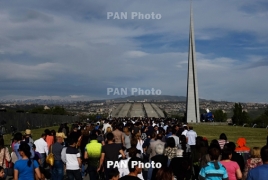
On April 24, Armenians in Armenia and Diaspora, along with many worldwide, commemorate 1.5 million innocent victims of the Armenian Genocide—the 110th anniversary of one of history’s gravest crimes.
On April 24, 1915, the Young Turk government ordered the deportation of the entire Armenian intellectual class in Constantinople. About 250 were arrested in the city, with the total exceeding 800 across the empire. The detainees were loaded onto trains at Haydarpaşa Station, never to be seen again. Many were stoned, tortured, or executed. Mass killings of Armenians, however, had begun earlier under Sultan Abdul Hamid during 1894–1896. Estimates suggest that between 1.5 and 2 million Armenians were exterminated in the Ottoman Empire during World War I, wiping out the population of the six vilayets of Western Armenia.
The genocide gave rise to the Armenian Diaspora, composed of survivors and their descendants who found refuge abroad. Even during the genocide (1915–1923), several countries condemned the massacres. The United States passed three such resolutions (1916, 1919, 1920), though they did not halt the actions of the Ottoman Empire. In 1915, France, the United Kingdom, and Russia issued a joint declaration condemning the extermination of Armenians. Despite more than a century passing, Turkey still denies the genocide and maintains an aggressive policy of denialism both domestically and internationally.
The Armenian Genocide has been recognized by Uruguay, Russia, France, Lithuania, Brazil, Austria, the lower house of Italy’s Parliament, 49 out of 50 U.S. states, and the parliaments of Greece, Cyprus, Argentina, Belgium, Wales, Switzerland’s National Council, Canada’s House of Commons, and Poland’s Sejm, as well as by the Vatican, the European Parliament, and the World Council of Churches.

